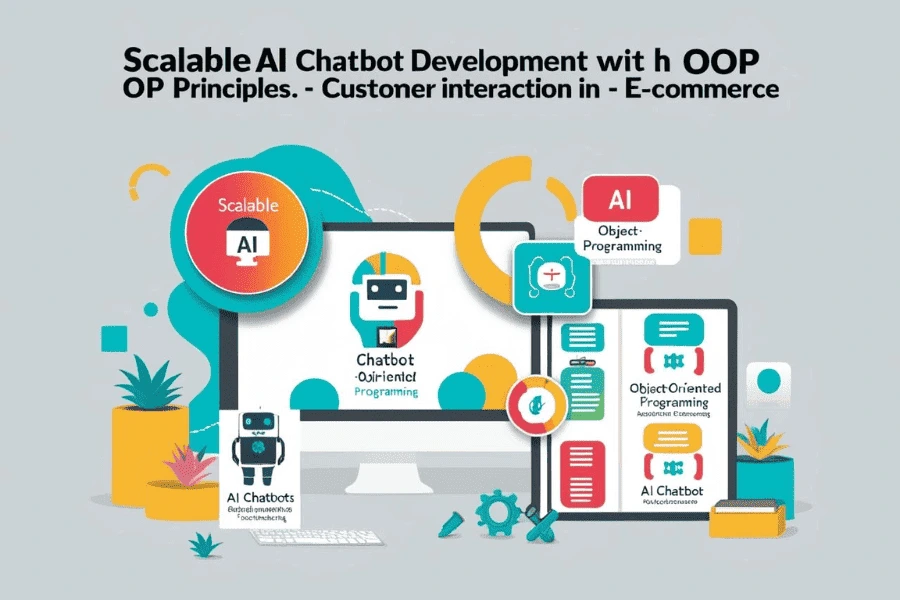Scalable AI Chatbot Development with OOP: Enhancing Customer Interaction in E-commerce
Introduction
As customer expectations continue to rise, AI-powered chatbots have become a vital part of the e-commerce experience. From product inquiries and order tracking to personalized recommendations, chatbots enhance customer support and streamline the buying journey. However, to remain effective across millions of users and a wide variety of use cases, chatbot systems must be scalable, flexible, and maintainable. This is where Object-Oriented Programming (OOP) plays a pivotal role, offering a structured, reusable approach to building intelligent, adaptable chatbot architectures that grow with business demands.

Inheritance and Specialization for Use-Case Expansion
OOP’s inheritance allows developers to create specialized chatbot behaviors without rewriting the core logic. For example, a SalesChatbot might inherit from a base Chatbot class and override certain methods to prioritize product recommendations. Similarly, a SupportChatbot could include enhanced issue-resolution workflows.
This allows businesses to deploy multiple chatbot types tailored to different departments or customer journeys—all built on a shared, maintainable codebase.
Polymorphism for Multi-Channel Integration
Modern chatbots must function across various channels such as websites, mobile apps, messaging platforms (like WhatsApp and Facebook Messenger), and even voice assistants. Using polymorphism, different ChannelInterface classes (e.g., WebChatInterface, TelegramBotInterface) can all implement the same methods defined in a common interface, ensuring that core functionality remains consistent across platforms.
This makes the chatbot omnichannel-ready and simplifies future integration with emerging technologies.
Scalability Through Decoupled Components
Thanks to encapsulation and modularity, OOP enables chatbot systems to scale horizontally. Individual components like NLP processors, recommendation engines, or analytics modules can be deployed as microservices that scale independently based on usage patterns. For example, during holiday seasons, the IntentClassifier service may require more compute resources than the EscalationHandler, which can be adjusted accordingly. Additionally, OOPs abstraction allows developers to replace or upgrade components (like switching to a more advanced language model) with minimal disruption.
Personalization and Continuous Learning
A well-designed UserProfileManager class can maintain behavioral data, purchase history, preferences, and feedback—feeding into AI models for better personalization. Combined with a FeedbackLoop class, chatbots can learn from user interactions and improve accuracy over time. These components can be extended with customer segmentation logic, offering even more precise and tailored experiences.
Conclusion
In the dynamic world of e-commerce, AI chatbots must be fast, smart, and scalable. Object-Oriented Programming offers the right architectural foundation to build chatbot systems that are not only intelligent but also maintainable and extensible. By breaking down chatbot functionality into specialized, reusable components, businesses can deliver seamless customer interactions at scale, across multiple channels, and with continuous adaptability. As AI and customer expectations continue to evolve, OOP ensures that your chatbot infrastructure is ready to evolve with them.
Active Events
3 mistakes aspiring data scientist should avoid
Date: October 1, 2024
7:00 PM(IST) - 8:10 PM(IST)
2753 people registered
Best Tips To Create A Job-Ready Data Science Portfolio
Date: October 1, 2024
7:00 PM(IST) - 8:10 PM(IST)
2753 people registered
Bootcamps
Data Science Bootcamp
- Duration:8 weeks
- Start Date:October 5, 2024
Full Stack Software Development Bootcamp
- Duration:8 weeks
- Start Date:October 5, 2024
